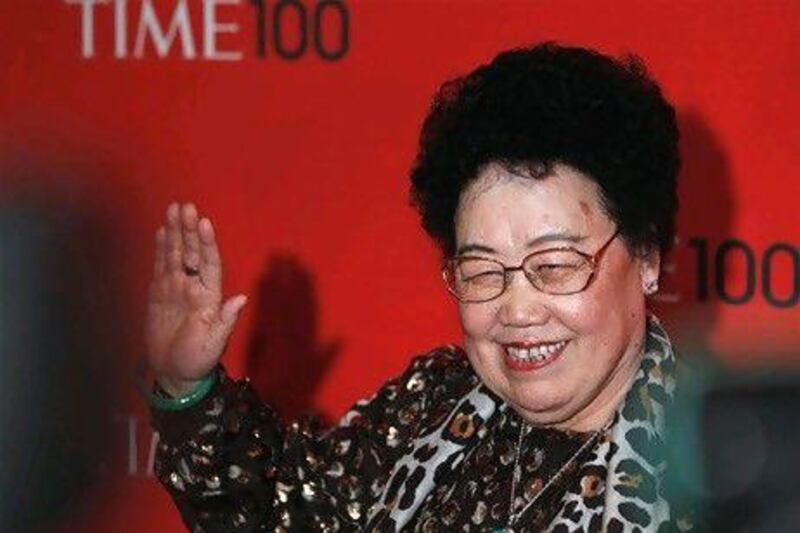Jinbao Street, which runs a little way east of the Forbidden City, is one of Beijing's most upmarket areas.
There are car showrooms selling Ferraris, Lamborghinis, Maseratis and Rolls-Royces, designer clothing stores, five-star hotels and much more to lure the well-heeled.
At a guess, many people might assume a group of sharp-suited businessmen spearheaded this development.
In fact, the person behind Jinbao Street is an elderly woman who, with her oversized glasses, shock of black hair and woollen jumpers, looks more like a kindly grandmother than a billionaire property magnate.
Chan Laiwa, 71, the chairwoman of Fuwah International Group, is worth US$2.3 billion (Dh8.4bn), according to Forbes magazine.
However, Ms Chan is several billion dollars away from being China's richest woman. Wu Yajun, another property tycoon, has a net worth of $5.7bn and has been described as the world's richest self-made woman.
Mao Zedong famously said women hold up half the sky and, while it is not quite the type of emancipation the first leader of communist China had in mind, the past three decades of economic reform have seen many Chinese female entrepreneurs unleash their inner capitalists.
Of the world's 14 female dollar billionaires identified by Forbes, half come from China. They include the Hong Kong-based Chu Lam Yiu, and Xiu Li Hawken, a property tycoon who made her fortune developing underground shopping malls with her brother, and who is now a British citizen.
While being a member of a prominent family was key to the success of some female entrepreneurs, among them Ms Chan, who was brought up in Beijing's Summer Palace, the retreat of emperors, their success nonetheless offers hope to women from less exalted backgrounds.
"I think they are very inspirational," says Yan Guangying, 27, who works in sales and marketing for a company that offers services to improve indoor air quality. "I've watched them on television. There are sometimes programmes showing these successful women doing very well in their careers."
In China, women make up 46 per cent of the workforce, one of the highest figures in the world and just three percentage points shy of their overall share of the population. Moreover, of the more than 6 million who graduate from Chinese universities each year, about half are women.
While many still toil in the fields alongside men, and just as thousands continue to work in factories powering the manufacturing sector on which China's economic growth has been built, others are moving into the boardrooms.
About 29 million have become entrepreneurs and more than 30 per cent of China's private companies are at least partly owned by women.
Yet according to Susanne Choi, an associate professor who is a member of the gender research centre at the Chinese University of Hong Kong, the situation on paper may look favourable for women, but regulations linked to rights such as maternity leave are often not enforced.
"I have heard about quite a lot of discrimination against women in the labour market and quite blatant discrimination," she says.
She cites the case of PhD students who have been told at job interviews they will not be considered because they have not yet had children and so might take maternity leave later on.
"The law has a lot of protection, but in practice there's a lot of violation of the law," she adds.
But climbing the management ladder is easier in private companies, especially foreign-owned ventures, while state-run enterprises are thought to be less female-friendly at senior levels.
Still, being in management in China can be tough for women, according to Zhou Xiaomei, 41, an insurance saleswoman with many years' experience of the country's workplace.
"In some very big companies, the management team is mainly composed of men rather then women. Generally, Chinese men feel pressure if they have a woman boss. They feel it's awkward," she says.
Additionally, there is still a huge divide in attitudes between the relatively progressive coastal belts and the rural hinterlands.
One factor that could, by accident, prove beneficial to women's career development is China's one-child policy, even though it is heavily criticised by campaigners as an unjustified restriction on the reproductive rights of couples.
"When somebody only has one child, parents are more willing to invest in education. The women seem to benefit, because they receive more education than before," says Anita Chan, an associate professor in the department of social sciences at the Hong Kong Institute of Education.
Limits on the number of children also mean mothers are more likely to be able to call on four grandparents to look after what will often be a single grandson or granddaughter.
Women still believe, however, they face greater pressures than men to look after other family members, both children and elderly parents, and that this has the potential to hamper career development.
Yet there are sectors, such as certain service industries, where employees feel it is men, rather than women, who face discrimination.
Zhao Lan, 34, a sales assistant in a clothing retailer, says men struggle to find jobs in her line of work.
"The sales industry in China, it's mainly taken by women," she says. "Within this industry, people are promoted from the junior positions, so the management team are women as well. Maybe it's decided by the characteristics of the industry."
Overall, while challenges remain, many Chinese women are resolutely upbeat.
"I think China is better in terms of gender equality than any other country, whether it's western countries or other countries nearby," says Ms Zhou.
twitter: Follow and share our breaking business news. Follow us
iPad users can follow our twitterfeed via Flipboard - just search for Ind_Insights on the app.






